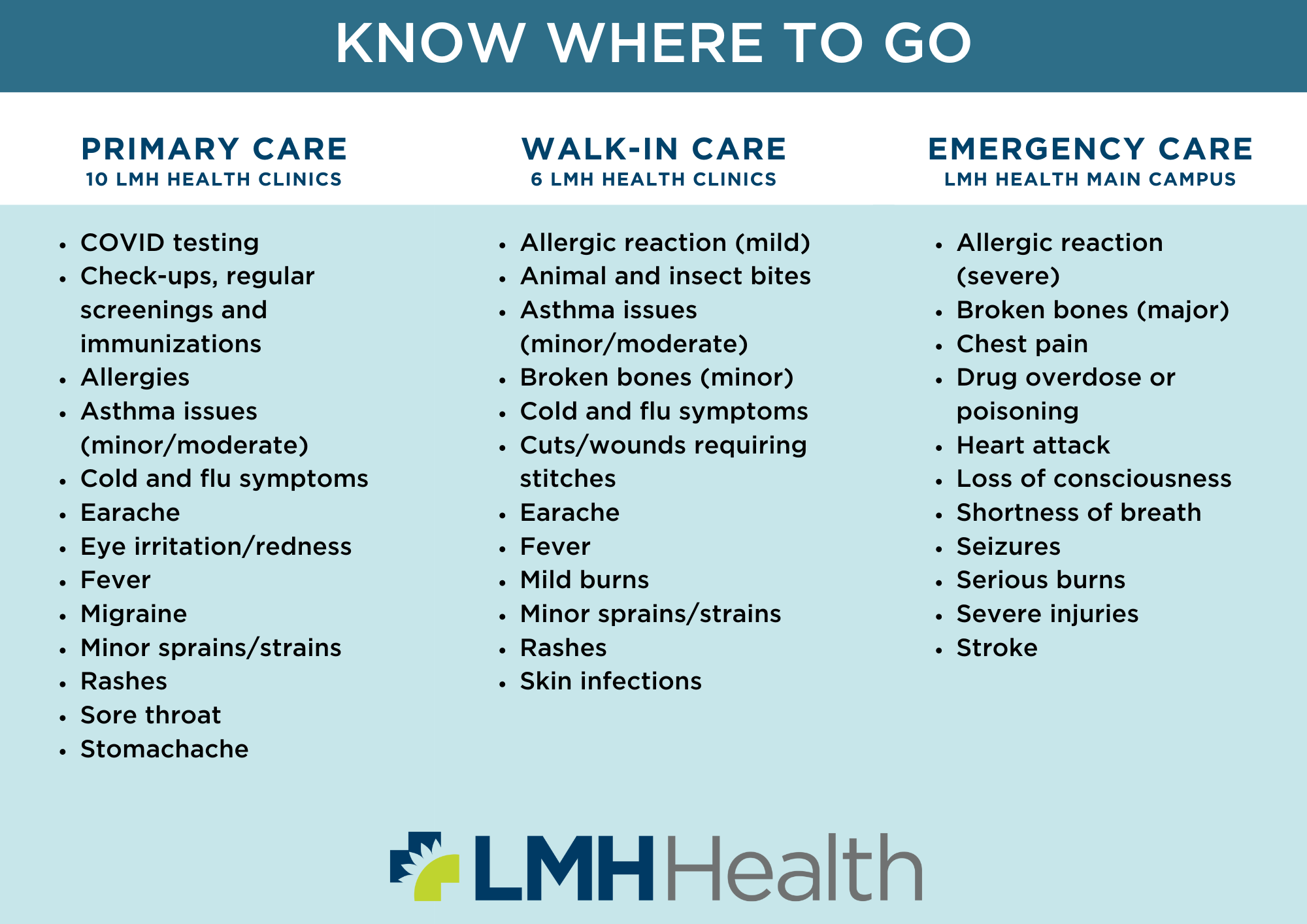Get the right care when you need it
Walk-in care, same-day care, emergency care – you may have heard of these healthcare terms, but do you know the differences? Are there differences? LMH Health has the answers.
Walk-in care
When you need care for minor injuries or common illnesses, a walk-in appointment might be the right fit. You can receive care for a number of conditions including:
- Asthma
- Cold and flu (cough, congestion, fever, sore throat)
- Earache
- Minor cuts, scrapes, sprains and strains
- Rashes
- Skin infections
David Dunlap, MD, a physician at LMH Health Primary Care – South Iowa Street, said that it’s important to understand that having a walk-in appointment doesn’t mean that you’ll be seen as soon as you walk through the clinic doors.
“Walk-in appointments are filled on a first-come, first-served basis. After you check in at registration, the first available provider will see you as soon as possible. There may be others already in line ahead of you, so the wait time can vary,” Dr. Dunlap said.
Walk-in appointments are available to everyone, even if you aren’t an LMH Health patient. Six LMH Primary Care clinics offer walk-in appointments for the general public:
- 6th & Maine
- Baldwin City
- Eudora
- McLouth
- South Iowa Street (near Target)
- West Campus (formerly Mt. Oread Family Practice)
Same-day care
If you’re a patient of any LMH Health family medicine or internal medicine provider and need to be seen for a non-emergent issue, skip the walk-in wait and call your primary care clinic to schedule a same-day appointment. If one isn’t available at your home clinic, our team will work to schedule you at another location.
“Instead of walking into a busy clinic and waiting to be seen, patients who already get care from LMH Health can make an appointment and arrive when it’s time to be seen,” Dr. Dunlap said. “You’ll be seen by providers you know and get the quality care that you expect from LMH.”
Emergency care
Hospital emergency departments (ED) provide medical care 24 hours a day, 7 days per week. EDs handle complex and critical needs, including heart attack, stroke and traumatic injuries.
You should be evaluated in the emergency department for symptoms including:
- Abdominal pain (severe)
- Broken bones or dislocations of the finger, toe or elbow (major)
- Chest pain
- Coughing or vomiting blood
- Deep cuts and injuries
- Drug overdose
- Loss of consciousness
- Poisoning
- Seizures
- Serious burns
- Shortness of breath, especially with COVID or flu symptoms
- Stroke symptoms
- Thoughts of self-harm
- Uncontrolled bleeding
- Unexplained vision changes
“Chest pain, seizures or trouble breathing – these are all symptoms that you should get care for immediately,” Dr. Dunlap said. “If you have a life-threatening injury or illness, go directly to the emergency department at the LMH Health Main Campus, or call or text 911.”
Who should I see? How do I know?
When you’re sick or in pain, knowing where to go for the right care can be confusing.
“If you have an injury or illness that you’d normally address with your primary care provider, a walk-in or same-day appointment may be the best option,” Dr. Dunlap said.
He emphasized that if you have a condition that requires several hours of treatment, including ruling out things like heart attack or stroke, you should seek a higher level of care.
“If it’s something that needs an ambulance, head to the emergency department,” he said, “and if you aren’t sure, visit our website at lmh.org/right-care. The team at LMH Health is here and ready to care for you when you need us.”
